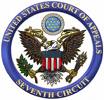 The Seventh Circuit had four new opinions in criminal cases last week. In United States v. Millbrook (No. 07-2931), the court (per Judge Rovner) affirmed the defendant’s conviction and sentence for drug trafficking and other offenses. The defendant’s appeal raised several issues, the most interesting of which was yet another Rule 404(b) question regarding the use of prior crimes evidence. I have blogged about several of these cases recently, criticizing the Seventh Circuit’s deference to poorly justified decisions by district court judges to admit highly prejudicial prior crimes evidence. In Millbrook, the court once again affirmed, albeit with a caution that the case was “at the outer limits of what is permissible under Rule 404(b).”
The Seventh Circuit had four new opinions in criminal cases last week. In United States v. Millbrook (No. 07-2931), the court (per Judge Rovner) affirmed the defendant’s conviction and sentence for drug trafficking and other offenses. The defendant’s appeal raised several issues, the most interesting of which was yet another Rule 404(b) question regarding the use of prior crimes evidence. I have blogged about several of these cases recently, criticizing the Seventh Circuit’s deference to poorly justified decisions by district court judges to admit highly prejudicial prior crimes evidence. In Millbrook, the court once again affirmed, albeit with a caution that the case was “at the outer limits of what is permissible under Rule 404(b).”
Millbrook possessed cocaine, but suggested that it was for personal use, not trafficking. In order to counter this theory, the government introduced expert testimony that the amount of drugs in Millbrook’s possession indicated an intent to distribute. The government also introduced into evidence the defendant’s twelve-year-old conviction for selling cocaine, notwithstanding Rule 404’s prohibition on using prior crimes to establish a defendant’s propensity to commit crime. Yet, it seems to me that a juror is almost certain to view the evidence in precisely this sort of way: Millbrook dealt before, so he must have been dealing again now. The court concluded, however, that the evidence was properly admitted to show, not propensity, but Millbrook’s intent to distribute. The court observed, “[T]he line between propensity and intent is a fine one.” Here, it is nearly so fine as to be invisible.
What really troubled the court, though, was not the difficulty of distinguishing between propensity and intent, but the twelve-year gap between the two prosecutions. It was this time lag that prompted the court’s warning about being at the “outer limits.”
In United States v. Alexander (No. 07-3420), we seem to have another in the long line of cases in which a defendant is penalized for his lawyer’s carelessness. Alexander was sentenced to 151 months under the career offender provision of the federal sentencing guidelines. Prior to his sentencing, however, the Sentencing Commission proposed Amendment 709 to the guidelines, which modified how career offender status was determined. Under Amendment 709, Alexander’s guidelines range would have been only 63-78 months. Unfortunately, Alexander’s lawyer did not bring Amendment 709 to the sentencing judge’s attention. Although the Amendment had not yet taken effect, the judge might have taken the impending change into account in determining Alexander’s sentence.
By the time of the appeal, Amendment 709 was law — indeed, had Alexander been sentenced only six weeks earlier, his guidelines range would have been reduced by more than seven years. On its face, there seems something unjust when so much of a man’s life is made dependent on the happenstance of court scheduling. Yet, the Seventh Circuit (per Judge Posner) concluded:
The failure of the defendant’s lawyer to have advised the judge of the pending amendment makes the argument frivolous. It would require that, in preparation for sentencing, the judge canvass all the possible sources of information or opinion or insight or advice that might influence him in deciding how severe a sentence to impose. If, after the defendant was sentenced, his lawyer discovered a source of enlightenment that the judge had somehow overlooked in his pre-sentencing research, the defendant would be entitled to be resentenced. The sentencing process would be interminable.
Given the seven years of Alexander’s life at stake, it strikes me as a bit cold-blooded for the court to emphasize judicial convenience so much as the decisive value in the case. It also strikes me that Alexander could get some relief without opening the floodgates to claims premised on “all the possible sources of information or opinion or insight or advice”; after all, it is an unusual and remarkable event when the Sentencing Commission itself reaches the conclusion that one of its earlier policy decisions was mistaken. There would be good, principled reasons to treat this type of new information differently from just about any other new “source of enlightenment.”
In United States v. Middlebrook (No. 08-1074), the court (per Judge Flaum) affirmed the sentence imposed in a bankruptcy fraud case. The court’s analysis turned largely on the factual question of whether the defendant had sufficient assets to pay off a debt owed to the bankrupt company, which affected the loss calculation under the federal sentencing guidelines. Given the recent surge in bankruptcies, I wonder if we will also see a surge in bankrupcy fraud prosecutions.
Finally, in United States v. Sims (No. 08-1348), the court (per Judge Posner) agreed with the defendant that his Fourth Amendment rights were violated by a search warrant that failed to identify with particularity what the police were looking for when they searched his house. However, the gun found in the house was properly used as evidence against the defendant under the “inevitable discovery” exception to the exclusionary rule.
